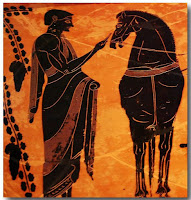As if the world didn’t have enough
problems already, Donald Trump has pulled the USA out of the Paris Climate Agreement
which, for all its limitations, represented a multilateral human
acknowledgement that greenhouse gas emissions were wrecking our planet. Time
for a look at the history of awareness of the damage humans can do to the rest
of the natural world, an awareness already developed in the Father of
Zoology, Aristotle.
When he is describing shell-fish, we discover
that in the lagoon on Lesbos the red
scallop has actually been rendered extinct. It has been destroyed partly by droughts but also ‘partly by the dredging-machine used in their
capture’. This is probably the earliest reference to overfishing in world literature. Aristotle also cites the destruction
which can be cause by human interference, motivated by financial greed, with
naturally occurring animal populations. A Carpathian tried to make money out of
hare breeding, and introduced the first pair onto his island. Carpathos was
soon over-run with hares, which devastated its crops, vegetable beds and plant
ecology.
Aristotle is aware of the destructive
potential of farming, as a form of interference in natural processes. He even
suggests that kitchen vegetables flourish better if left to the elements than
if they are irrigated artificially. He certainly condemns some human practices
in the farming of animals as contrary to nature and pernicious.
 Some animal breeders tried
to make the young males of certain species breed with their own mothers. This mother-son
inbreeding was attempted either because the owners could not afford to hire a
stud or because the animals they possessed were regarded as particularly fine specimens with specific attributes they wanted to perpetuate. This practice is
not unknown amongst breeders of pedigree dogs today, although it is rightly
regarded as genetically risky and abusive; line breeding, where animals mate
with distant cousins, is infinitely preferable. Aristotle is certain that
animals do not naturally want to mate with their mothers, and has
collected examples of animal resistance to enforced ‘Oedipalism’: ‘The male
camel declines intercourse with its mother; if his keeper tries compulsion, he
evinces disinclination.' On one occasion, when intercourse was being declined
by the young male, the keeper covered the mother and put the young male to her. But after the intercourse the young
male camel bit his keeper to death. In another example, he reports that a young
stallion forced to impregnate his own mother committed suicide by hurling himself of a cliff.
Some animal breeders tried
to make the young males of certain species breed with their own mothers. This mother-son
inbreeding was attempted either because the owners could not afford to hire a
stud or because the animals they possessed were regarded as particularly fine specimens with specific attributes they wanted to perpetuate. This practice is
not unknown amongst breeders of pedigree dogs today, although it is rightly
regarded as genetically risky and abusive; line breeding, where animals mate
with distant cousins, is infinitely preferable. Aristotle is certain that
animals do not naturally want to mate with their mothers, and has
collected examples of animal resistance to enforced ‘Oedipalism’: ‘The male
camel declines intercourse with its mother; if his keeper tries compulsion, he
evinces disinclination.' On one occasion, when intercourse was being declined
by the young male, the keeper covered the mother and put the young male to her. But after the intercourse the young
male camel bit his keeper to death. In another example, he reports that a young
stallion forced to impregnate his own mother committed suicide by hurling himself of a cliff.
Methods of raising and feeding horses worry
Aristotle. Horses should be allowed to roam freely at pasture, since then they
remain free of disease apart from an affliction of the hoof which is in any
case self-rectifying. But stables are breeding-grounds for malnutrition and all
forms of infection: ‘stall-reared horses are subject to very numerous forms of
disease: one which attacks the hind-legs’ (Equine Degenerative Myeloencephalopathy?)
Aristotle can have known nothing about
species resonance. Yet he tells us of an instance in 395 BCE. All the ravens
disappeared from southern Greece when a battle much further north resulted in a
particularly high death toll. Ravens are opportunistic carrion birds. Aristotle
calmly infers from this, that even across vast distances, ‘it would appear that
these birds have some means of intercommunicating with one another’. It’s a
pity Trump doesn’t have a similar means of inter-human communication.






No comments:
Post a Comment